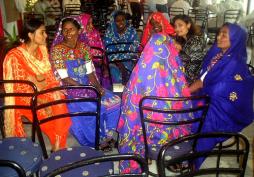ReBlog of the Week: "When Radio Meets Mobile in Pakistan" by Corinne Ramey
In our Mobile First Society, the phone is becoming the great equalizer. In this week's ReBlog, Corinne Ramey from MobileActive.org takes a look at how people in Pakistan (and the rest of the developing world) listen to radio on their mobiles, and why this could have a potentially disruptive, and democratizing, impact.

In Pakistan even the cheapest mobile phones, those without cameras or other advanced features, come with the ability to listen to FM radio. Every day, and especially during cricket matches, people walk around the streets with their phones pressed to their ears, tuned into their local stations, says Huma Yusuf, a journalist based in Pakistan.
In Pakistan and other countries in the developing world, mobile phones are ubiquitous. In June 2009, Pakistan had 94.3 million mobile subscribers, or about 58 percent of the population, according to the Pakistan Telecommunications Authority, a government agency. And mobiles phones have become a popular way to tune into radio, a medium that has already been documented to be powerful in democratization and civil society. Although its not yet clear what effect the combination of mobile and radio will have, mixing increased mobile penetration with radio is a potentially powerful combination.
The evolving relationship between mobiles and radios was one of the subjects of a recent report by LIRNEasia, a think tank that studies ICT policy across the Asia Pacific. The most surprising finding was that in three of the countries studied -- Bangladesh, India and Pakistan -- more people own mobile phones than radios, says Ayesha Zainudeen, research manager at LIRNEasia.
About 24 percent of people in Pakistan own radios, according to the study. Not only has phone ownership surpassed radio ownership in some countries, but people are tuning in to the radio on their phones. According to the study, about 7 percent of people in Pakistan listen to radio on their phones. However, Zainudeen said the numbers likely underreported the number of listeners. In 10,000 face-to-face interviews conducted by the researchers, people reported other family members listening to the radio on a phone shared within the family, which was not counted in the study.
In Pakistan, where radio stations operate under state restrictions, radio operators have become creative to share useful content, says Yusuf, the journalist. For example, FM stations will invite guests who will talk about issues that are technically illegal to discuss on the air. "We have a poor government licensing department," said Yusuf. "There's a lot that happens, so they forget and don't realize they need to shut something down." Radio stations have also used traffic reports, which are permitted by the government, as a means of reporting gang violence, looting and other unsafe conditions. In this article, Yusuf writes:
The radio journalist Waqar Azmat advised drivers to avoid the area known as Gurumandir, "because the conditions there are not good, there is no traffic in the area." A few minutes later, at 2:26 p.m., he returned to the airwaves to say, "traffic on Shaheed-e-Millat Road is very bad, as it is on Sharah-e-Faisal. There's madness all the way until Tipu Sultan Road. Drivers should choose their routes carefully so that they don't become victims of bad traffic."
Descriptions of traffic became code for urban warfare and violence, warning listeners where it wasn't safe to travel or be outdoors. In the future, Yusuf thinks that the combination of radio and mobiles could become especially interesting is in Pakistan's North-West Frontier Province (NWFP) "This is the place where radio can have most explosive impact," she said.
Currently, the Taliban has about 150 illegal FM radio stations in this area, but the Pakistani government is considering allowing other stations in order to counter the Taliban. "That legislation is expected soon," said Yusuf. "If that passes, I think that lots of incredible things will happen." While the government is unlikely to allow community radio stations across the country - for fear of the power of local reporting, said Yusef - they also recognize the potential impact that community radio stations could have against the Taliban. The Obama administration has also supported the use of cell phones and radio in this area. "The way Obama phrased it is that we're losing the information war against the Taliban," said Yusuf.
As more people in Pakistan (and the rest of the developing world) listen to radio on their mobiles, the growing number of listeners could have a potentially disruptive, and democratizing, impact. And likely, these listeners won't just be tuning in to cricket scores.
Corinne Ramey has written for publications including The Forward, the NY Daily News, City Hall News, The Capitol and the Manhattan Times. On the web, she's written for blogs including PBS Mediashift Idea Lab, MobileActive.org and DMIBlog.com.
The original post over at MobileActive.org
Corinne Ramey's blog
Follow her on twitter @coryramey












